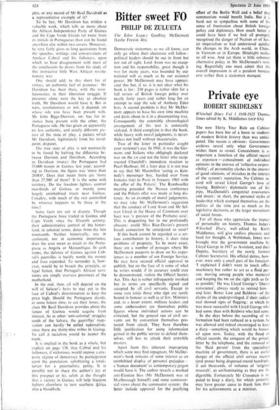Bitter sweet FO
PHILIP DE ZULUETA
Democratic statesmen, as we all know, can only go where their electorate will follow: political leaders should be out in front but not out of sight. Lord Avon was no excep- tion and his responsibility, great though it was for many years, was bounded by our national will as much as by our national power. Mr McDermott may have appreci- ated this but, if so, it is not clear what his book is for: 230 pages is rather slim for a full review of British foreign policy over nearly forty years and rather long for an attempt to stop the sale of Anthony Eden hats. A second problem is that Mr McDer- mott appears to have his own time machine and darts about in it in a disconcerting way. Consequently the ostensibly chronological arrangement of his text is constantly violated. A third complaint is that the book, while heavy with moral judgments, is never- theless not itself without inaccuracies.
Two of the latter in particular caught your reviewer's eye. In 1941, it was the Ger- mans and Italians who obligingly declared war on the us and not the latter who recip- rocated Churchill's immediate reaction to Pearl Harbour. Of a later date it is not true to say that Mr Macmillan 'acting as Ken- nedy's messenger boy, hustled over from Jamaica (sic) to Paris in January 1963 with the offer of the Polaris'. The Rambouillet meeting preceded the Nassau conference and the Polaris offer was made at long dis- tance. As an example of moral judgements, we may take Mr McDermott's suggestion that the conduct of Lord Avon and Mr Sel- wyn Lloyd in the House of Commons over Suez was 'a preview of the Profumo case'. This is disquieting but to me profoundly obscure: could Miss Rice-Davies's present Israeli connection be anticipated so soon?
If this book cannot be regarded as a ser- ious contribution to history, it does raise problems of propriety. To be more exact, there are a number of passages where Mr McDermott purports to draw on his exper- iences as a member of HM Foreign Service. He may have secured official approval to publish, but on the face of it some of what he writes would, if its accuracy could ever be demonstrated, violate the Official Secrets Act. This Act is rather infrequently invoked but its terms are specifically signed and accepted by all civil servants. Except in some rare crisis those who sign are surely bound in honour as well as at law. Ministers and, to a lesser extent, military leaders and some ambassadors are themselves public figures whose individual actions can be criticised, but the general run of civil ser- vants are by convention themselves pro- tected from attack. They have theresfore little justification for using information gained in the public service to defend thein- selves, still less to attack their erstwhile masters.
Apart from this inherent impropriety which some may find repugnant, Mr McDer- mott's book remains of some interest as an uninhibited display of personal prejudice— a 'human document' as contemporary jargon would have it. The author reveals a marked anti-Etonian bias (Mr McDermott was at Marlborough himself) and some controver- sial views about the communist system: the latter include approval for the pacifying
effect of the Berlin Wall and a belief that communism would benefit India. But it is hard not to sympathise with some of his sense of frustration about British foreign policy and diplomacy. How much better it could have been if we had all promptly recognised the danger of Nazism or of Sov iet imperialism or had understood quicker the changes in the Arab world, in China. in Vietnam or in Europe. Hindsight makes us all wise. And yet there is little coherent alternative policy in Mr McDermott's writ- ing. Regretfully one must admit that the overall impression is of a petulant bureau- crat rather than a statesman manqué.






































 Previous page
Previous page